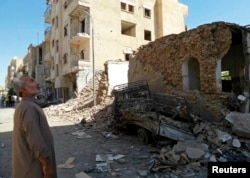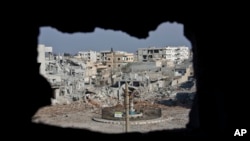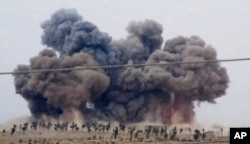The terror attacks in Paris and San Bernardino have added urgency to the conundrum now facing the U.S. and its allies: What to do about the Islamic State group?
Coalition partners have conducted more than 8,700 strikes against IS targets in Iraq and Syria, but critics, like Senator John McCain, say air power is insufficient. They are calling for the U.S. to send in ground forces.
"Offensive combat against dug-in foes is extremely difficult,” said James F. Jeffrey, former U.S. ambassador to Iraq, now with the Washington Institute for Near East Policy.
“You can see how long it has taken for a very large force to take Ramadi, even though there are a lot of Sunni Arabs involved in there, along with the Iraqi military and U.S. airpower. But if you want to generate a momentum, U.S. troops are very good at that," he said.
Sending in troops would send out a powerful message that the U.S. is willing to get its feet dirty, he said.
"We think we can just tell other people to go on the offensive when we're not?” he said. “I mean, who are we? The basic role we have shown ever since World War II is we have to be in the fight. You're not in the fight at 20,000 feet."
Jeffrey envisions a joint European/Arab ground force backed by U.S. military advisers and trainers.
Aim to contain
Some analysts caution that a ground war would further fan IS's narrative that the caliphate is engaged in a defensive war against Western hegemony.
"American attempts to reorganize the politics of other countries by the sword have foundered on nationalist resistance to outsiders, unreliable local allies, deeply embedded cultural practices, and the inherent crudeness of the military instrument," Barry Posen, director of MIT University's security studies program, recently wrote in The Atlantic magazine.
He argued that airstrikes already have stalled IS expansion, which he said could explain why IS has begun to focus on "theatrical attacks" abroad.
Posen believes the U.S. should establish a no-fly zone over northern Syria, deploy more special-operations forces, step up intelligence operations and intensify strikes on IS oil interests. He also advocates pressuring Saudi Arabia into using its "clout and resources" to counter IS's "poisonous message."
Terror expert and author Jessica Stern argues that the U.S. should take a lesson from George Kennan, the U.S. diplomat who in 1946 argued in favor of "patient but firm and vigilant containment" of Soviet Union expansion.
"ISIS, too, will no doubt eventually collapse as a result of its equally false utopian promises and difficulties delivering even rudimentary human needs, such as health care," Stern wrote in a separate Atlantic essay.
Some analysts say the group may already be floundering. "IS planned for every contingency but one," said Musa al-Gharbi, Managing Editor for the Southwest Initiative for the Study of Middle East Conflicts (SISMEC).
"They anticipated that a lot of people would either begrudgingly accept their occupation or actively endorse it," he said. "They did not expect to see this mass exodus of Sunni Arabs of their target demographic, in numbers of hundreds of thousands, from areas that were already sparsely populated."
Their flight is a strong counter to the IS narrative of caliphate as a utopian ideal, al-Gharbi said, and it has cost IS dearly in dollars and cents.
"Oil prices have fallen considerably, and so IS is increasingly having to rely on taxation, that is, extortion, from the population in order to keep themselves financially solvent," he added.
Those who are fleeing to Europe — a trip that can run upward of $10,000 or more, said al-Gharbi — are those members of the population who tend to be better-educated and more highly skilled.
"ISIS is not only losing a lot of taxpayers, they are losing the taxpayers who pay the most taxes," al-Gharbi said, using a common acronym for the Islamic State.
Conversely, foreign recruits tend not to have skills that IS needs to run its enterprises and government. For this reason, he believes the West should embrace as many refugees as possible.
Diplomacy unlikely
Former Ambassador Jeffrey dismissed the idea of negotiation with IS in one word: "madness."
"Definitely outside the realm of practicality," echoed Aymenn Jawad al-Tamimi, a Jihad-Intel Research Fellow at the Middle East Forum who recently leaked an IS administrative blueprint to London's The Guardian newspaper.
"Theoretically, ISIS does allow treaties with outside powers, but the terms that they impose are so stringent that I think it would be impossible that they could negotiate with any government," he said.
IS forbids external relations with any state hostile to "Islam's spread," a broad definition that would likely be applied to all Western governments, al-Tamimi said. Further, IS demands that any treaty should serve Muslim interests, not those of "disbelievers."
"Negotiating would also mean having to extend legitimacy to them as a state," al-Tamimi said.







